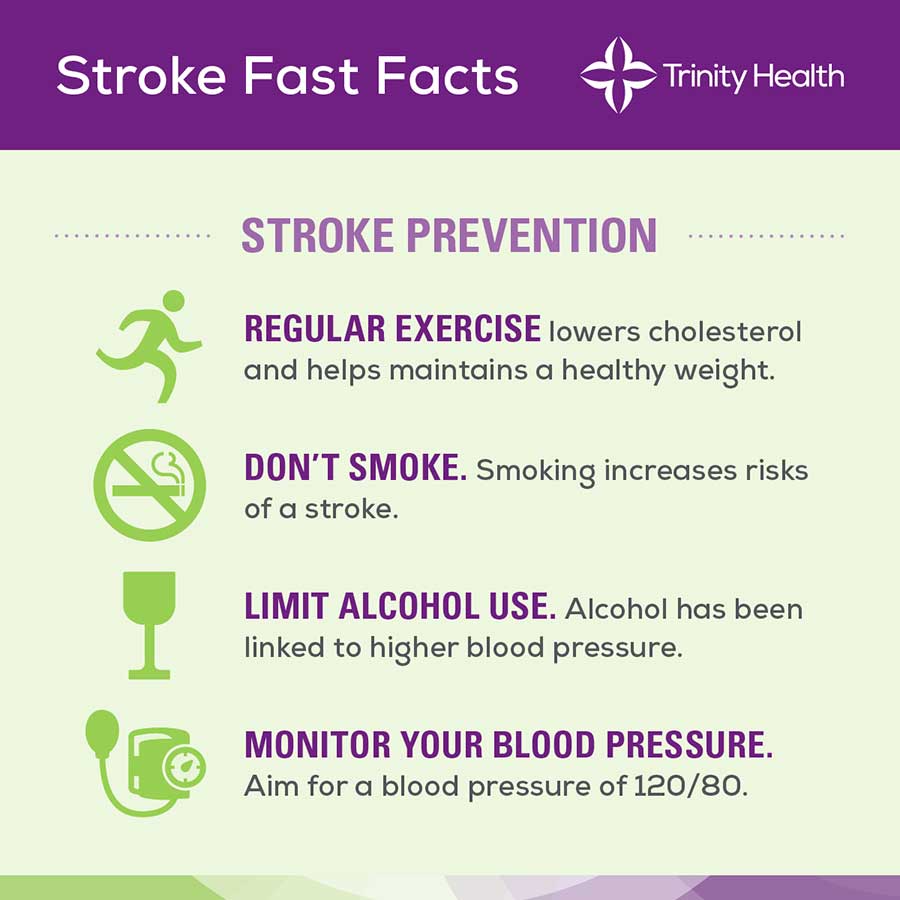Stroke and Cerebrovascular Disease
What is a Stroke?
A stroke is when blood flow to the brain is blocked or there is sudden bleeding in the brain. A stroke that occurs because blood flow to the brain is blocked is called an ischemic stroke. While a stroke that occurs because of sudden bleeding in the brain is called a hemorrhagic stroke.
A stroke is a medical emergency that requires immediate attention—every minute counts. Knowing the signs of a stroke and acting quickly can save lives, as the first few hours are crucial to minimizing brain damage. If you or someone you know is experiencing a stroke, CALL 911 immediately. Early intervention can make all the difference in preventing long-term damage and improving recovery.
More than 80% of strokes are preventable by managing risk factors and making healthy lifestyle choices. Understanding stroke risk factors, prevention strategies and recovery options is essential to maintaining your health and reducing your stroke risk.
Trinity Health Michigan delivers comprehensive stroke care available 24 hours a day. An expert team of vascular neurologists, nurses, radiologists and others comes together within minutes. We quickly pinpoint the stroke type and location and deliver the appropriate therapies to restore blood flow.
What are the Stroke Risk Factors?
Common risk factors for stroke include:
- High blood pressure
- Smoking
- High cholesterol
- Diabetes
- Obesity
- Family history of stroke
- Poor lifestyle choices, such as poor diet, lack of exercise and excessive alcohol consumption
Understanding your personal risk factors is critical to stroke prevention.

Are you at Risk?
Learn if you’re at a higher risk for a stoke with our quick, Health Risk Assessment. Gain personalized insights in how to reduce stoke likelihood.
Take the AssessmentWhat are the Signs of a Stroke?
Knowing what to do if you exhibit signs of a stroke is critical. Every minute that a stroke goes untreated, an estimated 2 million neurons die in the brain. Knowing the signs of a stroke can save lives.
B.E. F.A.S.T.
- B: Balance: Sudden loss of balance or coordination
- E: Eyes: Blurred vision, double vision, or loss of vision in one eye
- F: Face: Drooping on one side of the face, difficulty smiling, or trouble speaking
- A: Arm: Weakness or numbness in one arm
- S: Speech: Slurred speech, difficulty understanding words, or inability to speak
- T: Time: It is crucial to act quickly if you notice these symptoms, as they may indicate a stroke.
Stroke Prevention with Healthy Lifestyle Choices
While a stroke is never 100% preventable, making certain lifestyle and health choices can impact the likelihood of suffering a stroke. Healthier diets, reducing alcohol consumption and not smoking are just a few of the ways you can improve your odds. Read our on blog on healthy lifestyle choice you can make to reduce your risk.

Stroke Recovery at Trinity Health
At Trinity Health, our comprehensive stroke program is there for you every step of the way. Stroke recovery typically involves physical, occupational and speech therapy to regain lost skills and functions. Medications and surgery may be needed for complications. Early intervention and consistent rehabilitation are key to maximizing recovery.
Our specially trained nurses provide around-the-clock monitoring to help your recovery stay on track. From the latest in treatment options to post-stroke rehabilitation, our physicians, nurses and staff are there to assist you in your road to recovery. We know that experience a stroke can be a challenging life changing event, our stroke survivors support groups are part of the healing process as well.
Award-Winning and Nationally Recognized Stroke Care
Our Stroke Program is award-winning and nationally recognized for treatment and recovery.
Awards and Recognition include:
- U.S. News & World Report: High Performing Stroke Program
- American Heart Association & American Stroke Association: Get with the Guidelines®
- Advanced Stroke Certifications:
- Comprehensive Stroke Center
- Primary Stroke Center
- Thrombectomy-Capable Stroke Center
- Acute Stroke Ready Center
Types of Cerebrovascular Disease and Stroke We Treat and Procedures
Conditions we treat include:
Abnormal tangle of arteries in veins that can divert oxygen-rich blood away from the brain
Bulge in a blood vessel wall due to a weak spot that can leak blood or rupture, causing a brain bleed
Fatty deposits (plaques) build up in the blood vessels supplying the brain and neck
Abnormal growth in the blood vessels that supply the brain
Advanced form of coronary artery disease in which plaques limit blood flow to the brain
The more common form of stroke, which happens when a clogged artery cuts off blood flow to the brain
Blood flow disruption due to an aneurysm rupture
Procedures:
Prevents blood from entering balloon-like pockets of blood vessel tissue by using a tiny clip to seal them
Treats aneurysms by packing them with coils of a thread-like substance
Injects a substance to close off blood vessels that feed small brain bleeds and malformations
Strengthen weak spots in blood vessel walls using a device to reinforce them
Thrombectomy is a medical procedure that involves removing a blood clot from a blood vessel.
Additional Stroke Resources

Are you at Risk?
Learn if you’re at a higher risk for a stoke with our quick, Health Risk Assessment. Gain personalized insights in how to reduce stoke likelihood.
Take the Assessment



